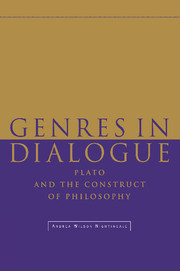Book contents
- Frontmatter
- Contents
- Acknowledgments
- Abbreviations and texts
- Introduction
- 1 Plato, Isocrates, and the property of philosophy
- 2 Use and abuse of Athenian tragedy
- 3 Eulogy, irony, parody
- 4 Alien and authentic discourse
- 5 Philosophy and comedy
- Conclusion
- Bibliography
- General index
- Index of passages from Plato
Introduction
Published online by Cambridge University Press: 23 October 2009
- Frontmatter
- Contents
- Acknowledgments
- Abbreviations and texts
- Introduction
- 1 Plato, Isocrates, and the property of philosophy
- 2 Use and abuse of Athenian tragedy
- 3 Eulogy, irony, parody
- 4 Alien and authentic discourse
- 5 Philosophy and comedy
- Conclusion
- Bibliography
- General index
- Index of passages from Plato
Summary
Clov: What is there to keep me here?
Hamm: The dialogue.
Beckett, EndgameThe fact is that every writer creates his own precursors. His work modifies our conception of the past, as it will modify the future.
Borges, “Kafka and his Precursors”In book three of the Laws, in an account of the deterioration of Athens from the time of the Persian wars, Plato ascribes the city's increasing anarchy to the mixture of traditional genres of music and poetry (698a–701c). As the Athenian Stranger says at 700d–e,
After [the Persian wars], as time passed, there arose as leaders of an unmusical lawlessness poets who, though artistic by nature, had no knowledge of what is just and lawful in the domain of the Muses. These people, frenzied as bacchantes and (KεραννύνTες) dirges with hymns and paeans with dithyrambs and imitated songs for the flute in cithara-tunes and mixed (συνάγoνTες) all the genres with one another. On account of their ignorance, these men unwittingly slandered art, saying that it does not have any standard of correctness, and that it is judged correctly by the pleasure of the auditor, regardless of whether he is a good or a bad man. Having created artistic compositions of this nature and added words that were similar in kind, these poets engendered in the populace a contempt for artistic norms and the bold conceit that they were capable of judging these things.
- Type
- Chapter
- Information
- Genres in DialoguePlato and the Construct of Philosophy, pp. 1 - 12Publisher: Cambridge University PressPrint publication year: 1995



